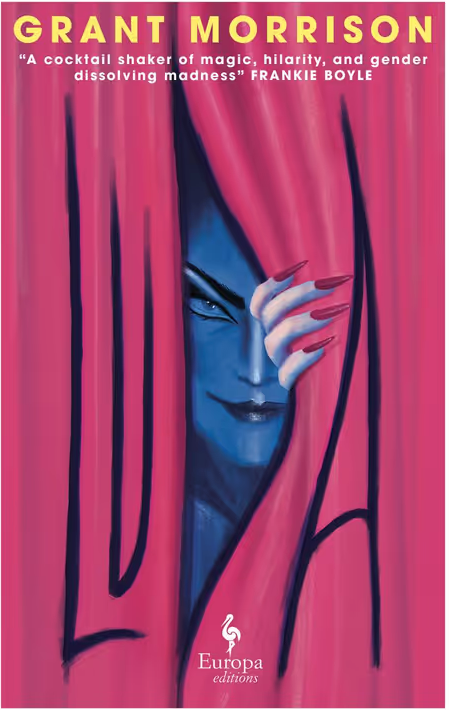Is this book pretentious? Is it a work of brilliance? I’ve read it twice, and I’m still not sure. It’s written by Grant Morrison, formerly a luminary of Vertigo Comics. (If you were like me, you had a whole pile of these in your teenage bedroom, and they made you glow with an inner sense of superiority when you compared yourself to your friends who were instead into X-Men or Batman.)
It’s essentially a shaggy dog story. Luci LaBang, a magician and drag queen, tells the story of her involvement in cutting edge panto ‘Phantom of the Pantomime’ in the city of ‘Gasglow’. When the lead actress has a terrible accident, she’s replaced by the mysterious Luda, another young man in drag, who shows up out of nowhere. As rehearsals continue, one by one, other cast members undergo terrible accidents. What’s really going on? (Pronouns and identities shift a bit based on the characters’ current personas, much like what’s going on the play itself.)
Everything is leading up to the ending, which requires an understanding of pantomime. Don’t worry, the book explains this to you clearly, especially if you missed out on this British cultural experience as a child. Most of the drama is centred around the unfolding rehearsals for the Phantom of the pantomime, which digs into the entire world behind this type of play.
“The trick in panto is for performers to establish an intimate, confessional relationship with the audience while wrapping them into the performance as a kind of omniscient chorus.”
Luda is eager to learn magic from Luci, ‘the Glamour’, which, as far as I could understand, is used to have psychic LSD trips. For those used to hard magic systems like Brandon Sanderson’s, you’d be going, what? A complete magic system, and all it does is give you surreal visions and get you high? This is what a lot of real world occultists were doing with all of their rituals and drugs, including Morrison’s own practices. There’s a lot of talk about the Glamour, but other uses are mysterious and evasive.
“The Glamour provided the means to blend the real, and the imagined, smoothing out divisions between the physical and the not, subject and object, the masculine and feminine, God and Devil. The Glamour encouraged new relationships between seeming binaries that folded all polar opposites together into multifaceted wholes.”
What Luda wants to learn from it is shapechanging, or how to disappear into herself. Perhaps to become Luda ‘for real’. Her presence, at first entertaining, becomes more sinister, and her backstory more convoluted, tormented and surreal as the story progresses.
Luci dismisses Luda as her apprentice, and you could read the end arc as Luda’s revenge against her former mentor, or is it? Or perhaps as an indirect, surreal battle between dueling magicians. Anyway, like the pantomime, the Glamour and the story itself, nothing is really certain and that too, I think, is the point.
Recommended, especially if you like Morrison’s work or reality-blurring narratives.
